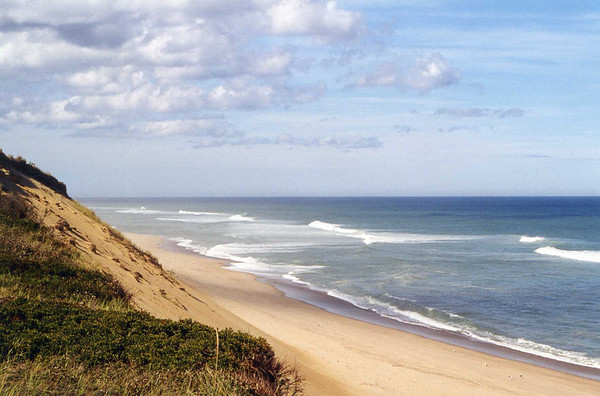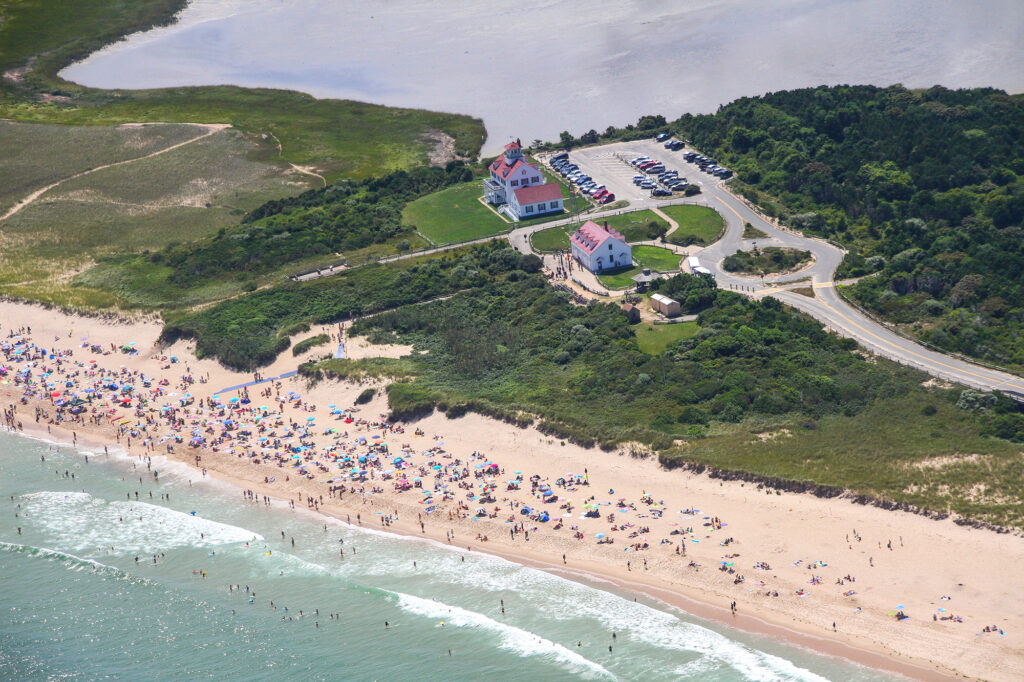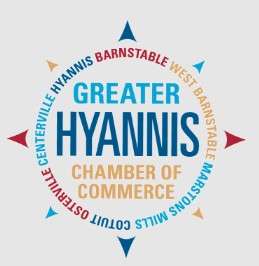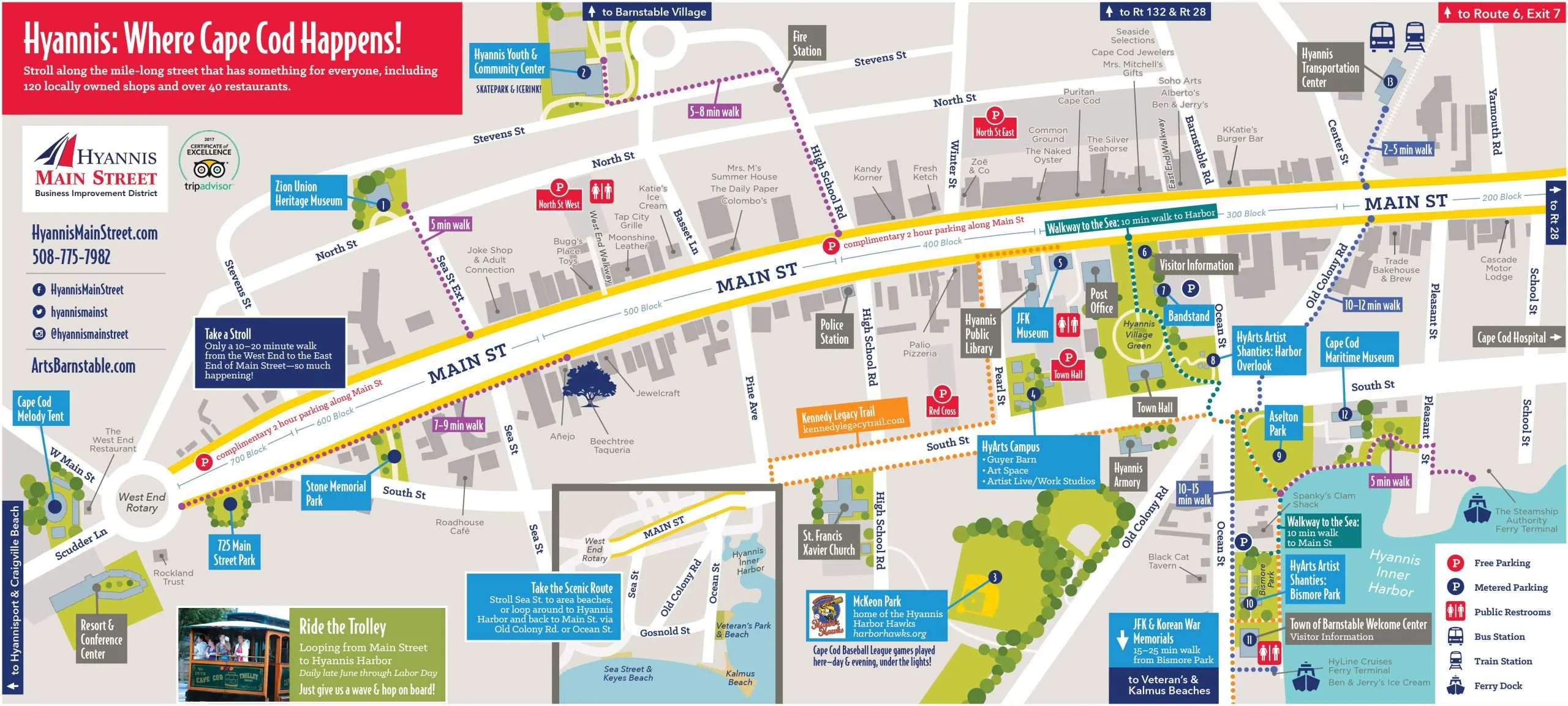
6. Protecting Cape Cod’s Seashore
President John F. Kennedy loved Cape Cod and it’s unique natural environment. In 1961, he signed legislation establishing an American treasure, the Cape Cod National Seashore, protecting the fragile coastline from Chatham to Provincetown. The 43,500-acre National Seashore has created recreational opportunities for millions of residents and tourists, and became a landmark that defines Cape Cod. The Cape Cod National Seashore area is on the east side of the Cape’s outer arm, about 20 miles from here.
Cape Cod National Seashore
On August 7, 1961, President John F. Kennedy signed a bill authorizing the establishment of the Cape Cod National Seashore. JFK had co-sponsored legislation for a new national park while in the U.S. Senate. He said the goal was "to preserve the natural and historic values of a portion of Cape Cod for the inspiration and enjoyment of people all over the United States." Called the "Cape Cod Model," this was the first time the federal government had created a national park out of land that was primarily in private hands. A controversial issue, there were months of hearings and meetings that eventually balanced private and public interests. After years of negotiations and rounds of legislation, the bill was made law in 1961, and the Cape Cod National Seashore was now protected by the U.S. Government. In his remarks at the signing ceremony of the bill, JFK said "From personal knowledge I realize very well how useful this is going to be for the people of the Cape and Massachusetts and New England and the entire United States." Today the Seashore draws millions of visitors from around the world who enjoy the Great Beach and its unique villages.
Erosion
In just some several-thousand years, Cape Cod will no longer exist. The Cape was formed when glaciers during the Ice Age deposited glacial till—the sediments deposited by a shifting glacier—around twenty thousand years ago. This means that much of the land that the Cape is made of is particularly vulnerable to erosion, and that fact is evident in just how much of Cape Cod’s shore is lost each year. The coast of the Outer Cape, the one that borders the Atlantic, has been eroding at a rate of a few feet per year, as it puts up with strong winds and waves from the ocean. However, this number can vary, and in years when there is a considerably strong storm, up to fifteen or twenty feet of the coast can fall away. Climate change over the past few decades has contributed significantly to the erosion of the Cape’s seashores, accelerating the increase in sea level, and speeding the process of the peninsula’s demise. Such rapid changes
to the shoreline are clear around Chatham Harbor and its southward Monomoy Islands, as the area today is unrecognizable compared to just three decades prior.
The deterioration of the National Seashore makes its way for no one. Several homes and other man-made structures have either fallen into the Atlantic or were required to be moved farther inland over the past decades. Perhaps most memorable is the retreat of the Nauset Lighthouse, which was accomplished in the 1990s as locals petitioned to have the seemingly doomed lighthouse shifted inward. Storms pose an exceptional threat, as they can cause often difficult-to-predict damage, which could see any shoreside home swept away in days. Although groups have come together to discuss potential plans to soften the impact of erosion, no comprehensive plan or action has been undertaken yet.
Seals and Sharks
Another hot topic in discussions of the National Seashore is the presence of sharks, alongside their favorite attraction, seals. Harbor seals and gray seals were once nearly hunted to extinction around Cape Cod and the Northeast until the Marine Mammal Protection Act of 1972 saw their protection. Since then, the seal populations in the U.S. have exploded, and now, Cape Cod and the encompassing Gulf of Maine are dotted with dozens of thousands of harbor seals and gray seals. The recovery in the seal population has also likely led to a similar recovery to the number of sharks in Cape waters, namely, the notorious great white shark. Each summer, shark-sightings headline articles in Cape media outlets, inciting caution and fear in the Cape’s summer population. Since 2012, there have been three incidents in which sharks have interacted directly with swimmers in Cape waters, one of which was fatal.
A number of Outer Cape residents have expressed frustration and contempt for the rising seal population. They believe seals, who prey on fish, pose a threat to the local fishing economy, and litter beaches with their waste, forcing beach closures. Additionally, the sharks that seals attract present an alarming danger at Cape Cod beaches. These residents feel that hunting of seals and sharks should once again be permitted to control their populations and make Cape beaches safer for people.
But is this really the case? And would killing these animals really be a solution? Local scientists state that the seals are not overpopulated and that much of the frustration with the surge in the number of seals is a result of the fact that no one today has witnessed a natural population. Scientists also proclaim that seals are improving and diversifying the Cape’s ecosystem by balancing the populations of other species, especially fish that feed on other fish. In fact, any shortage of gamefish in the region, particularly the striped bass, has been the result of the overfishing of these species.
The issue sparks a number of questions on what the relationship between people and nature should look like on Cape Cod and along our beloved National Seashore. Seals are frustrating people by consuming fish and flocking to beaches that residents feel they have a right to access and enjoy. But do humans have any “right” to safe waters at national seashores? Or should we
stick with understanding the risks we take each time we dive in?
Remarks of the President on Signing S. 857, an Act to Provide for the Establishment of the Cape Cod National Seashore
I would like to make a brief statement. Today, in signing S. 857, an Act to authorize the establishment of the Cape Cod National Seashore Park, I join the congress and hope that this will be one of a whole series of great seashore parks which will be for the use and benefit of all of our people.
This Act makes it possible for the people of the United States through their government to acquire and preserve the natural and historical values of a portion of Cape Cod for the inspiration and enjoyment of people all over the United States.
This is a wise use of our natural resources, and I am sure that future generations will benefit greatly from the wise action taken by the Members of the Congress who are here today.
I commend the Congress for giving very careful judgement in balancing off public needs in the interests of people who live in this section of the Cape, and I think that they have done an admirable job in serving both interests in this piece of legislation.
I co-sponsored, as a Member of the Senate, a similar bill. It is a very old part of the United States, and I must say that from personal knowledge I realize very well how useful this is going to be for the people of the Cape and Massachusetts and New England and the entire United States.
There are Members of Congress here today from Texas and Colorado and Utah who have seen in their own States the tremendous contribution which these national parks can make. If we are going to double the population in another fifty years or so, we can get some idea of how important preserving this section for all the people will be.
I think we are going to need a good deal more effort like this, particularly in the more highly developed urban areas, where so many millions of people now live, and work out the means of securing the advantages of recreation and leisure which these areas can bring. So I know that the government and the Congress will work together in seeing how they can carry on similar projects in other parts of the country.
This is a matter of great interest to me, and I express my appreciation to the Members of the Congress and to the Chairmen of the Committees, and to those Members of Congress particularly as I said from not only Massachusetts who worked hard on it in a bipartisan spirit but from all sections of the country who strongly supported this legislation.


![HYArts_2012_FNL_out_C[1] HYArts_2012_FNL_out_C[1]](https://kennedylegacytrail.com/wp-content/uploads/2023/02/HYArts_2012_FNL_out_C1-237x300.jpg)

![jfk-hyannis-museum-logo-2019-sm[1] JFK Hyannis Museum Logo](https://kennedylegacytrail.com/wp-content/uploads/2023/02/jfk-hyannis-museum-logo-2019-sm1.jpg)

